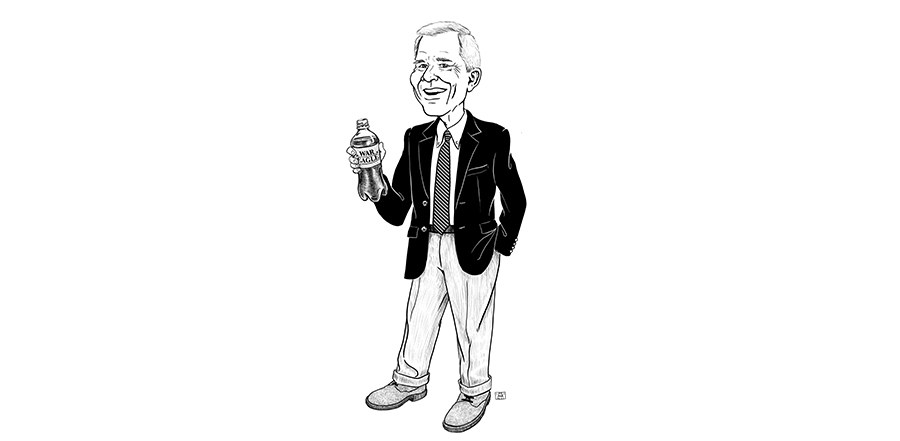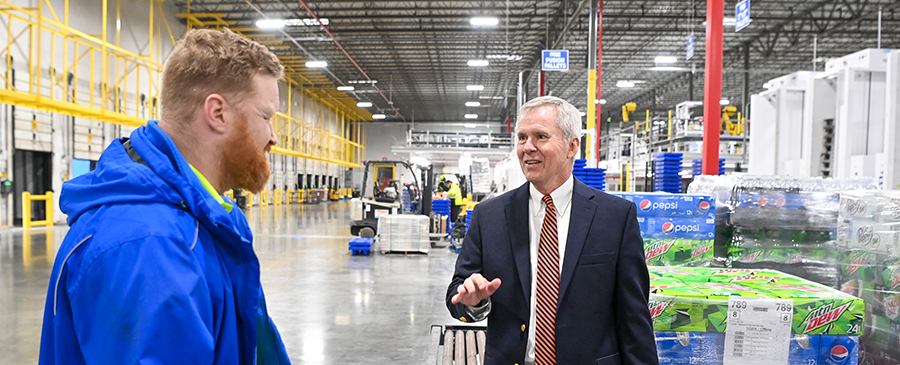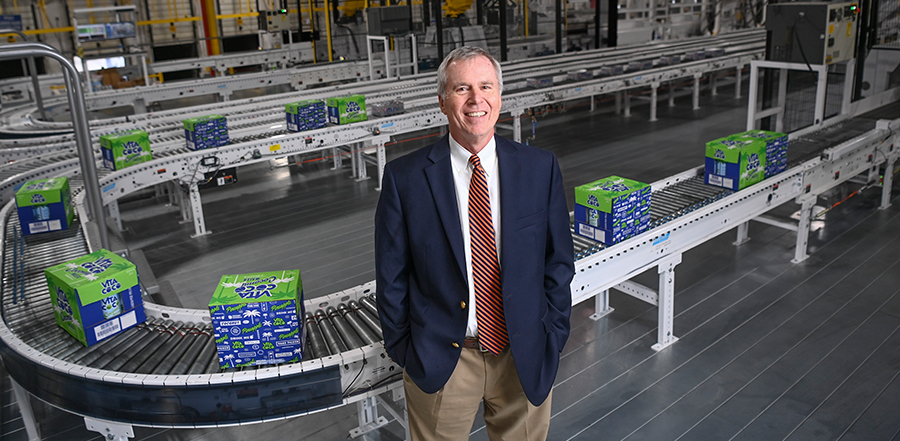Buffalo Rock Managed Healthy Growth During Pandemic

Kevin Conaway
Vice President and Chief Financial Officer
Buffalo Rock
Buffalo Rock is the largest single-family-owned Pepsi bottler in the nation. Kevin Conaway, a 1980 Harbert graduate, is the company’s executive vice president and chief financial officer. In this issue’s C-SUITE interview, he discusses topics such as sustainability efforts in the beverage industry and the challenges of managing through the pandemic.
Harbert Magazine: The theme of this issue of the magazine is sustainability, and bottling companies typically get a lot of attention in this area. Tell us about the sustainability efforts at Buffalo Rock and how they factor into the company’s business strategy.
Kevin Conaway: I’ll go back from the beginning. Buffalo Rock has been around since 1901. So clearly, historically, we have done several things from a sustainability standpoint. One of the key aspects was back in 1951, where we purchased the Pepsi Cola franchise for Birmingham. Back in the late 1970s, early 1980s, we acquired a lot of other smaller distributors, which led to what today is our franchise territory predominantly in Alabama, the Panhandle of Florida and southwest Georgia.
Along the way, we have been very active from an innovation standpoint. We developed the three-liter bottle, which really started the whole plastic bottle portion of the beverage industry, as well as developing the 12-ounce and 20-ounce bottle. What we’ve done most recently is we have pivoted and we announced two years ago a five-year, $300 million strategic capital expenditure program that we believe will really transform our company and help us lead into the next 40 to 50 years of business.
Not only historically, but today we are involved in efforts to continue to transform our business, as our business itself has changed relative to what consumers prefer to drink today versus what they drank 25 or 30 years ago and continuing to transform so that we can meet the needs of the business.
HM: Can you tell us a little bit more about those developments in packaging that changed things, the three-liter bottle and the 20-ounce bottle, how those came about and what the company’s leadership was on that?
KC: Sure. If you think back in theearly 70s, you basically had the returnable bottles, the glass bottles. Candidly, back then there was a lot of effort, a lot of time involved, a lot of manual labor to not only collect the bottles, but then you had to clean the bottles because the glass bottles were reused. You had a lot of cost involved and it just didn’t make a lot of sense going forward. There was a more
effective, more efficient way to manage that aspect of the business. So our current executive chairman Jimmy Lee’s dad and the senior leadership of Buffalo Rock came up with the idea of rather than returnable bottles, why not have plastic throwaway bottles? That led to discussions with PepsiCo whereby Buffalo Rock sold PepsiCo on the idea of initially the three-liter bottle, which then over time developed into the different package types of 12-ounce or 20-ounce bottles.
HM: Since the plastic bottles, unlike the glass bottles, are not reused, does the company make use of recycled plastic?
KC: We do have recycling and in the industry we’re heavily involved with our beverage associations, whether it’s on a state or national level. At the national level, you’ve got the American Beverage Association, which includes all of the beverage companies. Clearly, with the news of plastics and everything from an environmental standpoint, there is a pretty significant push for the beverage industry to do their part, to be a part of what do we do and how do we proactively address the plastic waste issue today. Again, that’s part of being what I would call a responsible corporate citizen. And we as a part of those associations are part of that initiative.
HM: The pandemic forced companies all across the business spectrum to adapt their business practices. How has Buffalo Rock dealt with the challenges of COVID?
KC: Let me say this: Nobody wishes COVID had occurred. For us, it’s really been about managing through COVID and the impact of the pandemic to our business and addressing how best to handle the changing dynamics on a day-to-day basis.
Initially, the executive leadership took a proactive approach. Starting the middle of March in 2020, we met every single day, whether it was by conference call, video call or in person to essentially talk about “What have we seen today? How do we need to pivot and manage on a day-to-day basis?” And as we went through and as time went by, those daily calls and conversations turned into weekly calls and conversations, but I will tell you from the start and continuing today, we have had three primary focuses.
One was the safety of our employee partners and their families. One was the continued financial stability and viability of the company. And then the third leg was how to continue to serve our customers and communities as best as possible during the pandemic. We proactively issued the protective gear, we provided constant communication to our entire workforce so that people were aware as the pandemic changed.
We’ve been very fortunate on a couple of fronts. One, we were considered an essential business, so we never had to stop or shut down. Our business is really two pieces. The most significant part of our business is on the retail side, delivering product to grocery stores, to large box stores like Walmart or Target, convenience stores, those types of retail outlets.
Because of the change in consumer behavior driven by the impact of COVID, our business actually increased on the retail side.
On what we call the on-premise side, that business is really driven by foot traffic. And when the world as we knew it shut down, foot traffic dissolved. And so the on-premise side of the business, restaurants, sporting events, any type of event, that business dried up.
Over the last two years, as life has turned into what I’m going to call more of the new normal, we have actually gained back a fair amount, if not most, of that type of business. So if you take both of those together, our business overall actually increased from a case volume standpoint. And again, it really has to do with how consumer behavior changed in relation to the pandemic.
HM: Aside from the impact of COVID, what are some of the biggest
changes you’ve seen in your time in this business?
KC: I’ve been here eight and a half years. What was changing before I got here, what has continued to change while I’ve been here and, candidly, what will continue to change beyond today is the number of SKUs that we deal with. It’s not just the brands we sell, whether it’s Pepsi, whether it’s Dr. Pepper, but it’s the total volume of beverage choices, waters, teas, ready-to-drink coffee, energy drinks, sparkling water. All these have added to the overall size of the portfolio. And then you layer in different package types. If you go down the beverage aisle, you can get what we call a fridge pack, which will be the case of 12 cans. You can buy the plastic bottles in multiple package types. You can get two-liters.
So all of those have driven the increase in the number of SKUs. Part of why we launched the strategic capital expenditure program that I mentioned earlier is we believe that over the next 10 years, it is possible, if not probable, that where today we have roughly a thousand SKUs, that’s going to double in size. And just the doubling of SKUs adds to the complexity of how we warehouse all this product. How do we distribute the product into our marketplace across our vast array of customers? It’s driving complexity and how we do it better so that we drive appropriate cost efficiencies as our business grows.
HM: Consumer preferences don’t remain static. What strategies does your company employ to adapt to these market changes?
KC: The key to being able to adapt is to be able to have the information on the front end so that we can plan and manage through as those changes occur. And there are a couple of ways that we are able to stay ahead of the curve. One is, as I mentioned before, we’re heavily involved in the different beverage associations. They are constantly doing studies, measuring, monitoring, assessing how consumer preferences, consumer behaviors have changed and continue to change. We also, as I mentioned before, sell the PepsiCo and KDP brands. KDP stands for Keurig Dr. Pepper.
We are heavily involved with each of those companies via peer groups. There’s constant communication. Again, a lot of data, a lot of data analytics that assess how consumer preferences are changing in our marketplace as well as across the country. And then perhaps the most critical is each and every day, we have constant communication across multiple folks talking to our customers and what they’re seeing in the marketplace and what they’re communicating to us that their customers are saying they need to see on their shelves.

HM: Almost every business has faced supply chain issues through the course of the pandemic. How have those affected Buffalo Rock and how has the company dealt with that?
KC: We’ve been very fortunate, but I will not sit here and tell you that we have not had to deal with supply chain issues. We obviously buy a lot of raw materials. We also buy purchase
product because we don’t manufacture
everything we sell.
What we have really seen is a lot more on the purchase product side. If we could get more product, we could sell more product, but because of supply chain issues that our suppliers have encountered, we end up being impacted by that as well. From an ongoing pandemic impact, supply chain has clearly been one of the issues that we’ve had to manage through.
We’ve been pretty fortunate because we have successfully managed through that and seen a growth of our business.
We could have grown that much more had we had more of the product.
The other side occurs from the labor market dynamics. Everything you read about, we have had to manage through that as well. We have roughly 2,200 employees. And so we have dynamics that we deal with, whether it’s open positions or employee partners who have actually contracted COVID or been in contact with somebody that has COVID.
And so we do the right thing. They’re doing the right thing. They quarantine, they isolate accordingly. We’re fortunate in that we have a workforce where everybody just basically picks up and makes up for somebody who is having to be out for a few days.
HM: The company has a very large new distribution center in Birmingham. How does it fit in the corporate strategy?
KC: If you’re familiar with Bruno’s, their former headquarters is about a mile and a half from here. We bought roughly 900,000 square feet of a 1.3-million-square-foot industrial warehouse facility because part of our plan is to build larger distribution centers.
Today, we have 14 distribution centers throughout our franchise to deal with higher SKUs or more SKUs that we believe will occur over the next 10 years. But to be able to do it more cost effectively, we are building, buying or renovating larger distribution centers that will serve a much larger area. We will end up with five or six much larger distribution centers, but it’ll help drive cost efficiencies.
HM: How has Buffalo Rock addressed issues of corporate social responsibility? What are some ways your company gives back to the community?
KC: I’ll start with giving back to the community, and then I will pivot to more of a social standpoint. We believe, and historically have always believed, that it’s important that we give back to the communities in which we live and work.
As I mentioned before, our footprint is Alabama, the Florida Panhandle and southwest Georgia. We are very active participants in United Way. We have multiple people who are active in many boards and organizations across all of our communities. That starts at the top. For example, Jimmy Lee is on the board of trustees for Children’s Hospital of Alabama and very heavily involved with that. We have many others that are involved from a volunteer standpoint. Across our footprint, we’re involved in different service days where we are serving in the community, different areas, different entities.
We also are heavily involved from a veterans standpoint. We encourage people to support veterans’ organizations and we employ quite a few veterans.
And as I pivot from a social standpoint, we actively support minority-owned businesses. Internally over the last couple of years, we’ve done a couple of things as it relates to our employee partners. One is we’ve created an excellence academy where we identify people we believe could become future leaders of the company. And so we engage them in a year-long program around skills training and development. They meet monthly, and it’s really a way for us to invest more in their future growth internally within the business.
We also have created an inclusion committee where we have multiple
people from what I would call all walks of life within the organization, different functional responsibilities, from different franchise territories. That committee is really about how we ensure that all of our employees feel included. They feel a part of the company. They help drive and develop the culture of the company and they feel good about the company they work for.
HM: How did your time at Auburn prepare you for a successful business career?
KC: Well, I had a great time at Auburn, but in all seriousness what I would say is that part of the Auburn Creed talks about hard work and that at Auburn University, my time there was a continuation of the lessons my parents instilled in me about how you need to work hard. Candidly, what they would tell me is you give an honest day’s work for an honest day’s wage, which might sound corny and cliché, but it really works.
They also ingrained in me, and my time at Auburn validated, that sometimes people see only the end result of what is behind the scenes — a lot of hard work and a lot of effort. That was a key for me at Auburn.
And then I would tell you the developing and nurturing, frankly, of what have become lifelong relationships. I’m not suggesting that you can’t do that outside of a college or university setting. But for me, I made friends and developed relationships that I have to this day. And it was through my time at Auburn.

HM: What advice would you offer current Harbert students who will soon be entering this increasingly complex and competitive business world?
KC: Keep learning. Again, I know it’s going to sound cliché. I’d love to tell you that I came up with this, but I’ve heard it many times over. I think as anybody goes through life, not just professionally, but personally, it’s a constant journey of learning. I would tell someone to always ask questions.
I would look for opportunities to expand your boundaries. Frankly, put yourself in an area that perhaps is not in your comfort zone. And again, I would go back to the relationship aspect. I would constantly develop and nurture relationships, especially with people who could actually mentor you. People who have been where you are or understand what you’re going through. And they have been where you’re trying to get to. But I would go back to what I said initially. I would keep learning, I’d ask lots of questions, I would enjoy the journey as you go both personally and professionally along your path.
HM: Are there any particular individuals who stand out as mentors or role models and who have shaped your career that you’d like to talk about?
KC: I have two, and these are non-family members. One is Albert Rains. He was a United States congressman for 20 years. I actually got to know him well because of my part-time job while I was in college. I worked at First Alabama Bank in Gadsden.
Here’s what struck me about him. He was very well known, very well thought of, but what struck me was he treated everybody the same. He respected people regardless of what their station in life might be, what they might do at the bank, who they knew or who they didn’t know. He just treated people with respect, regardless of who they were or what their station in life was.
The other individual is a gentleman by the name of Louis Henderson, and he became my mentor for over 20 years. We would meet at Chick-fil-A on Friday mornings from 7 to 8 o’clock when we were both in town. On average, that was about 40 times a year. So we met 800 to 900 times over 20-plus years. We talked about anything and everything. I got to know him first professionally, then that relationship really morphed into more of a personal relationship, and when I say we talked about everything, it was anything to do with family, business, sports, politics, economics, the environment.
He was somebody who, as I mentioned before, had been where I am, where I was and where I was trying to get to. And he was somebody I trusted completely with being able to talk through different aspects or things I was dealing with. Very helpful, very encouraging. And candidly, I’m a better person for not just Louis, but also Albert Rains being a part of my life.
HM: What do you know now that you wish you had known when you began your business career?
KC: I wished I had truly appreciated just how much technology was going to be a part of everything we do. When I came along, the laptop, the personal computer, actually had not been invented yet.
Technology clearly has advanced significantly and it does impact everything we do, especially in the world of data analytics. There’s a lot of information. There’s a lot of data. In an increasingly more complex world, technology allows us, even in a world with greater complexity, to take the data we have and be able to use it, not just to see where we’ve been, but to give us an idea where we’re headed so that we can proactively manage through that.

